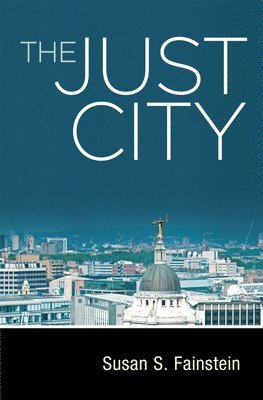
- Format
- Häftad (Paperback / softback)
- Språk
- Engelska
- Antal sidor
- 224
- Utgivningsdatum
- 2011-07-28
- Utmärkelser
- Winner of Cowinner, 2011 Paul Davidoff Book Award (Associati.
- Förlag
- Cornell University Press
- Illustratör/Fotograf
- 20
- Illustrationer
- 17 halftones, 3 maps
- Dimensioner
- 235 x 161 x 14 mm
- Vikt
- Antal komponenter
- 1
- ISBN
- 9780801476907
- 336 g
The Just City
- Skickas från oss inom 5-8 vardagar.
- Fri frakt över 249 kr för privatkunder i Sverige.
Passar bra ihop
De som köpt den här boken har ofta också köpt Who's Afraid of Gender? av Judith Butler (inbunden).
Köp båda 2 för 674 krKundrecensioner
Fler böcker av Susan S Fainstein
-
Divided Cities
Susan S Fainstein, Ian Gordon, Michael Harloe
-
The City Builders
Susan S Fainstein
-
Policy, Planning, and People
Naomi Carmon, Susan S Fainstein
-
Gender and Planning
Susan S Fainstein, Lisa J Servon
Recensioner i media
[Fainstein's] work deepens, enriches, and extends deliberative planning theory in complementary rather than antagonistic ways. Like the idea of justice itself, The Just City is not the last word concluding a debate. More important, it is a trenchant, penetrating, and reasoned contribution to precisely that discursive and contested, but necessary and fruitful deliberative process that fuels the hope for progress toward realization of the just city. -- Sarah J. Peterson * Journal of Planning Education and Research * The just city is one in which equity, democracy, and diversity are important considerations. This is in contrast with the city as growth machine. Fainstein examines three cities: New York, London, and Amsterdam. She provides a history of postWorld War II planning and then focuses on fairly recent cases of development in each. Her goals, though modest, are important if growing inequality in urban areas is to be reversed. Recommended. * Choice * Susan Fainstein's book is the result of some 20 years of intense research and thinking on the subject of the 'just city,' and it seems likely to me to become something of a classic.... Fainstein's slightly deadpan style serves only to make her accounts more compelling. A recent history of planning in London, written with equality, democracy and diversity in mind, is really useful as a teaching tool. Here the Docklands development, Coin Street and the 2012 Olympics are placed under scrutiny, with the last of those three, perhaps not surprisingly, receiving poor marks on the grounds of equity not least because the 'huge expenditure involved took away resources from other parts of London and the country more widely without providing them any benefits beyond the glory of hosting the Games.'... She notes that there are two possible responses to the injustices illustrated by the book. The first is to recognize the impossibility of achieving even small amounts of justice within the dominant system of global capitalism. The second, which is one that Fainstein herself adheres to, is that much can be achieved through incremental change. The book's final chapter is therefore devoted to a discussion of policies that are conducive to social justice in cities. Her vision is of a world where market forces no longer dominate decisions about city planning and justice drives the world of policy. -- Flora Samuel * Times Higher Education Supplement *
Övrig information
Susan S. Fainstein is Professor of Urban Planning in the Graduate School of Design at Harvard University. She is the author of The City Builders and coauthor of Restructuring the City and Urban Political Movements.
Innehållsförteckning
Preface Introduction: Toward an Urban Theory of Justice 1. Philosophical Approaches to the Problem of Justice 2. Justice and Urban Transformation: Planning in Context 3. New York 4. London 5. Amsterdam: A Just City? 6. Conclusion: Toward the Just City References Index
Du kanske gillar
-
48 Laws of Power
R Greene
Häftad


